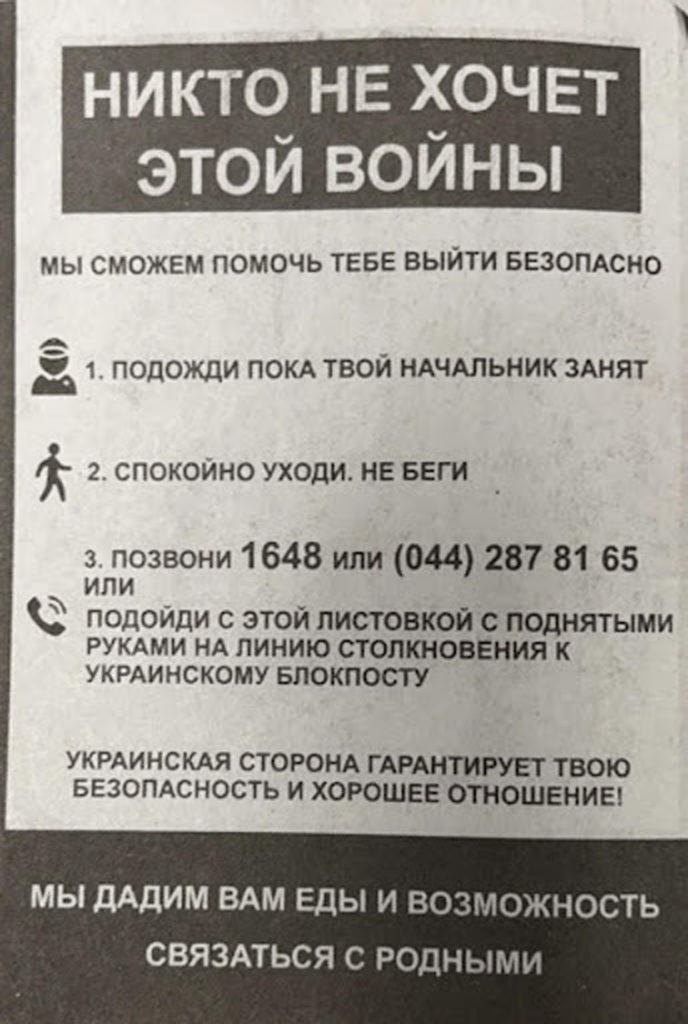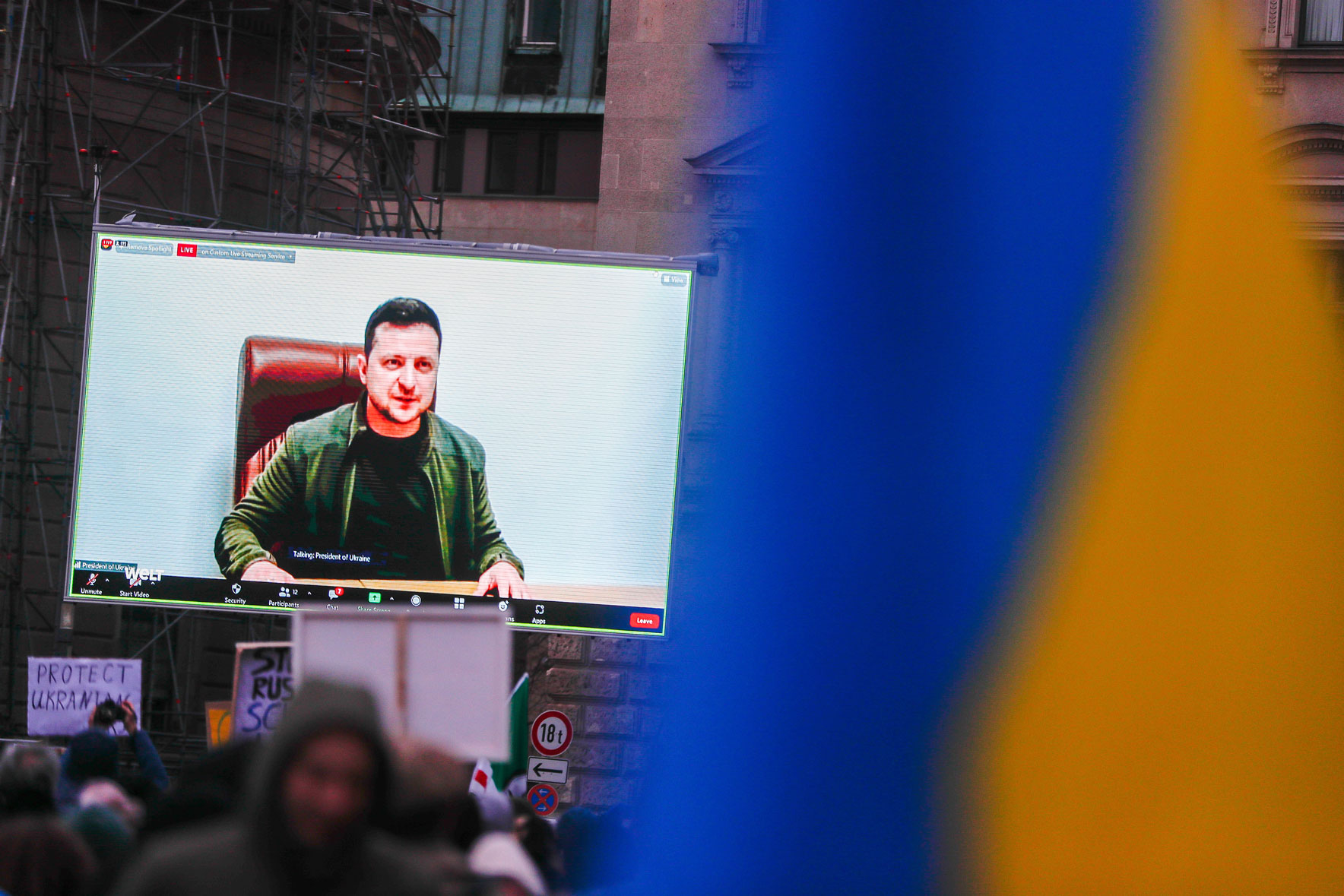About 10 days ago a Russian officer by the name of Lieutenant Bondarev saw a message come through on WhatsApp. “Hello dickhead,” it read. “Greetings from every Ukrainian you have offended! Be aware that you will never ever have a calm life! Karma will reach you.”
Bondarev seemed less fazed than one might have expected considering his interlocutor didn’t identify himself or say how he got the lieutenant’s phone number. “Greetings,” Bondarev replied. “I don’t give a damn what you and your buddies write to me. Karma will reach you faster, so u better take care of yourself.”
“Let’s hope that your people … at least take your remains,” the mystery messenger pinged back. “Because thousands of your comrades are rotting on Ukrainian soil.”
That last part is certainly true judging by press interviews given by Ukraine President Volodymyr Zelenskyy and by visual evidence of snow-capped corpses of Russian cadavers. The fate of Bondarev is not known, but this exchange, one of a dozen New Lines has examined, is characteristic of a less-examined aspect of Ukraine’s impressive defensive strategy against Russia’s monthlong and largely stalled invasion: psychological warfare aimed at degrading the enemy’s already low morale.
Ukrainian telecom specialists, New Lines has learned, have been using hacked telephone databases to track down the personal communications of Russian soldiers not just already deployed inside Ukraine but also those still garrisoned at the border. Many of these exchanges, particularly the recorded ones, have been uploaded to YouTube channels and other platforms, mostly untranslated.
Tellingly, Ukrainians have targeted not only Russians but also Belarusian troops, who have yet to receive an order to deploy by Alexander Lukashenko’s dictatorship, which Western intelligence sources say is constantly stalling on pressure from Moscow.
The Russian war dead who have been removed from the battlefield, known colloquially as “Cargo 200,” pass out of Ukraine and into Belarus daily, fostering what the Ukrainian security officials believe is Minsk’s increasing unwillingness to throw in as a co-combatant of President Vladimir Putin’s conquest.
These injunctions, one Ukrainian source told New Lines, are as a rule much “nicer” than the ones sent to Russians.
An example of a Belarus-aimed psyop:
Ukrainian messenger (UM): “I am calling Sergey Marchuk. Are you Sergey?”
Belarus soldier (BS): “Yes.”
UM: “Listen, we have information that you are located on the border and preparing to enter and fight. Is it so?”
BS: “It is possible.”
UM: “Are you there now? You are military? Or did I dial the wrong number?”
BS: “Yes.”
UM: “You are military, yeah? Ok, I understand. You are planning to invade Ukraine. Keep in mind that all of you will be killed there. Do you know how many Russians have already died here?”
BS: “I understand you.”
UM: “Look, I’m calling to tell you not to come here [invade], not to make a mistake, because here you will for sure … ”
BS: “How could you reach me? How did you get the information?”
UM: “Look, we know each of you. We have a database of your soldiers. We have telephone numbers, names, surnames, dates of birth — we know everything about you, you get it? We don’t want Belarus to fight with Ukraine. If you go forward, you will all die here. We are waiting for you. Is it clear? Personally, I have tons of friends, relatives in Belarus, and I don’t want us to fight with Belarusians. Therefore make the right decision, don’t go to Ukraine because you will die!”
The extent to which such minatory communiques are affecting Belarus’ rank and file is unknown, although there have been credible reports of Belarusian opposition activists sabotaging the country’s rail networks to preempt or stifle any impending invasion of its southern neighbor.
Ukraine’s IT warriors, who are almost certainly working with the consent and cooperation of Ukraine’s government, have also been offering unsolicited advice on how best to surrender and to whom. Wobbly Russians have four options: the Ukrainian military, territorial defense units, the national police or the SBU, the domestic security agency. “Throw away your arms,” one message reads. “Stand forward. Put your hands up or wave a white flag.”
New Lines has also obtained a paper leaflet said to have been dropped at various front lines offering amnesty to would-be defectors or deserters and instructing them as to how best to escape their garrisons stealthily and cross over to the other side. It reads:
No One Wants This War
We will help you get out safely.
- Wait until your boss is busy.
- Quietly walk away, don’t run.
- Call 1648 or (044) 287 81 65.
Come up with your arms raised to the Ukrainian checkpoints on the line of contact with this flier.
The Ukrainian side guarantees your safety and good treatment!
We will give you food and the opportunity to get in touch with your relatives.

Not all responses from the Russian side have been as delicate as Bondarev’s.
“Suck my dick,” one soldier sent back to his anonymous petitioner, who added he would eat Ukrainian cuisine and rape Ukrainian women, an already alleged war crime committed by Russian occupying forces.
“I’m offering you a solution,” came the reply. “Kherson, as the whole of Ukraine, demonstrates that you were not welcomed and you were not invited,” it stated, referring to the one major city Russia has occupied, though in the face of mounting civilian resistance and Ukrainian military gains on its periphery. “You can take the risk or you can have a guarantee that you will stay alive and return home.”
Russia’s strategic failure to achieve a quick and easy regime change in Kyiv has been compounded by other setbacks on the battlefield. There is the verified loss of over 2,000 pieces of military equipment, nearly 40% of which have been captured by Ukrainian defenders. Intercepted communications from Russian soldiers speak of fuel and food shortages, a charnel house environment that makes “the Caucasus and Syria look like paradise,” logistical nightmares and flagging morale.
On March 29, Russia’s Deputy Defense Minister Alexander Fomin announced that it will “fundamentally cut back military activity in the direction of Kyiv and Chernihiv,” which is either the Russian Defense Ministry’s feint to buy time to resupply for a later offensive or its euphemistic acknowledgement that its defeats in these areas are too severe to sustain and so it is redeploying elsewhere, probably to the east. Two U.S. officials suggested this was in keeping with a “major” strategy shift, according to CNN’s Jim Sciutto. Indeed, Ukraine has retaken partial or whole possession of a host of towns and settlements northwest of the capital, most recently Irpin, one of the first cities north of Kyiv to fall to Russia. And videos circulating on social media appear to show Russian VDV (paratroopers) withdrawing from the region toward the Belarusian border.
Meanwhile, Russian forces make up for in manpower losses, now estimated at as many as 17,000 dead and three times that wounded, in imaginative obscenities. One recording shared with New Lines has an angry and possibly inebriated soldier using an epithet for gay people and describing what he’d like to do with both a Champagne bottle and 2-liter Kompot bottle to the Ukrainian caller’s friends and family.
Sign up to our mailing list to receive our stories in your inbox.



